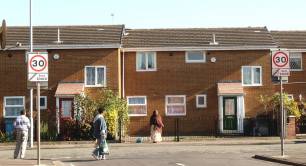Social economy housing: UK must play catch up
With homes costing 10 times the average salary in the UK, the housing crisis is the government’s biggest challenge. ResPublica associate David Fagleman proposes a new model for getting houses built, arguing that an increase in social economy housing could provide a solution for families and individuals looking for a home.
In discussions about the housing crisis you are likely to hear about the urgent need to increase supply, release land for development and build essential infrastructure alongside new homes. Given the scale of the crisis (we need to build 125,000 more homes a year to meet both population growth and tackle the backlog caused by decades of undersupply), these issues are of vital importance.
You will also hear about the need to build ‘affordable homes’, an issue of equal importance as we are experiencing a crisis not just of supply but also affordability; 1.4 million families sit on social housing waiting lists, private rents have hit an all time high and the average home costs 10 times the average salary (14 in London).
It is imperative that we build genuinely affordable homes both to buy and to rent. Otherwise, the crisis will deepen and areas with the highest property values, such as London and the South East, will become exclusive for those who can afford, and the housing benefit bill (expected to cost the public purse £25.4bn a year by 2019) will continue to soar.
Apart from the general concern, what sometimes escapes the debate is what type of affordable housing we could and should be building.
Recently, Capital Economics, the National Federation of ALMOs (Arms-length Management Organisations) and SHOUT (Social Housing Under Threat) called on the government to invest in building 100,000 new social homes, arguing that this would achieve better value for taxpayers’ money, as well as improve the living standards of many low-income households. Social housing plays an important role in the make-up of our housing market and the call to increase stock is a welcome addition to the plethora of solutions to the crisis.
What is currently overlooked from the debate is the role that social economy can play as part of these solutions.
Social economy housing models (including co-operative and social enterprise alternatives) can offer another affordable housing option, reduce the cost of living and provide an opportunity for smaller developers to enter to housebuilding market.
In comparison with other European countries, the UK stands out with its lack of social economy housing. For example, co-operative housing makes up 18% of the housing market in Sweden; 15% in Norway; 8% in Austria but only 0.6% in Britain.
Offering a different type of housing it seems only right that social economy housing plays a bigger role in Britain, and a crisis can often provide fertile ground for new ideas an innovations. As Peter Holbrook, CEO of Social Enterprise UK has argued, social economy housing models could revolutionise the housing market and communities should be equipped with the tools to achieve this.
In our recent report Devo Home we argue that responsibility for housebuilding and place-making should be devolved to a set of new locally-led bodies. What we call ‘Local Place Partnerships’ would be led by local authorities, which will orchestrate the multitude of different actors in the housebuilding process (private developers, housing associations, local businesses) and ensure that residents are part of the development process from start to finish.
By creating a local institution dedicated to this cause, the scale of the homes we need can be built, as can the social and economic infrastructure (the schools, hospitals and transport links) necessary to create thriving communities in which people can flourish.
Local Place Partnerships (LPPs) could play a huge role in releasing and making the most efficient use of surplus public sector land. In the report, we call for the Home and Communities Agency to transfer this land directly to LPPs, who can disseminate development-ready land to members of the partnership.
With the local authority at the helm and strong civic representation, this land can be used specifically for affordable homes and presents an opportunity to bring social economy housing into the fold. We also propose that residents should be empowered to call a Local Place Partnership in their area, thereby empowering them to take a lead role in the future and design of their neighbourhoods.
This can provide a framework for social economy housing, community land trusts and other innovative housing models to scale up and begin to play a bigger role in the solutions to the housing crisis. Given the extent of our housing woes, it is time these models had the opportunity to deliver a new option that for the many currently excluded from the housing market, can in fact be more suitable.
A healthy market is diverse, competitive and meets the needs of consumers. Our housing market does not currently do this. The social economy could change that.
Photo credit: Kathleen Conklin



